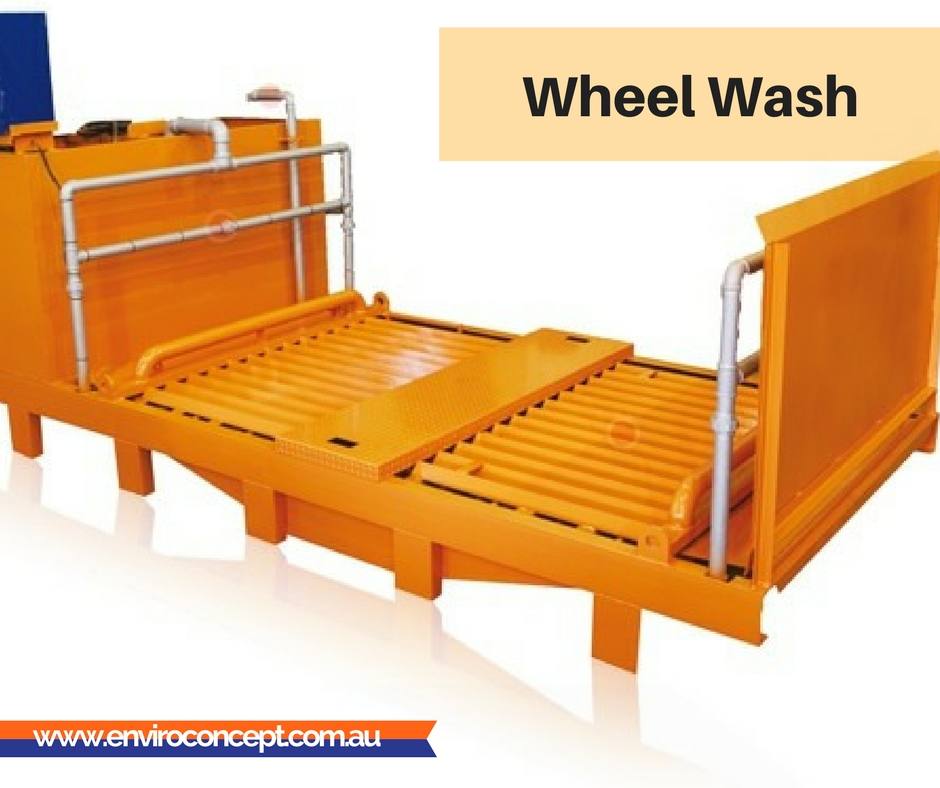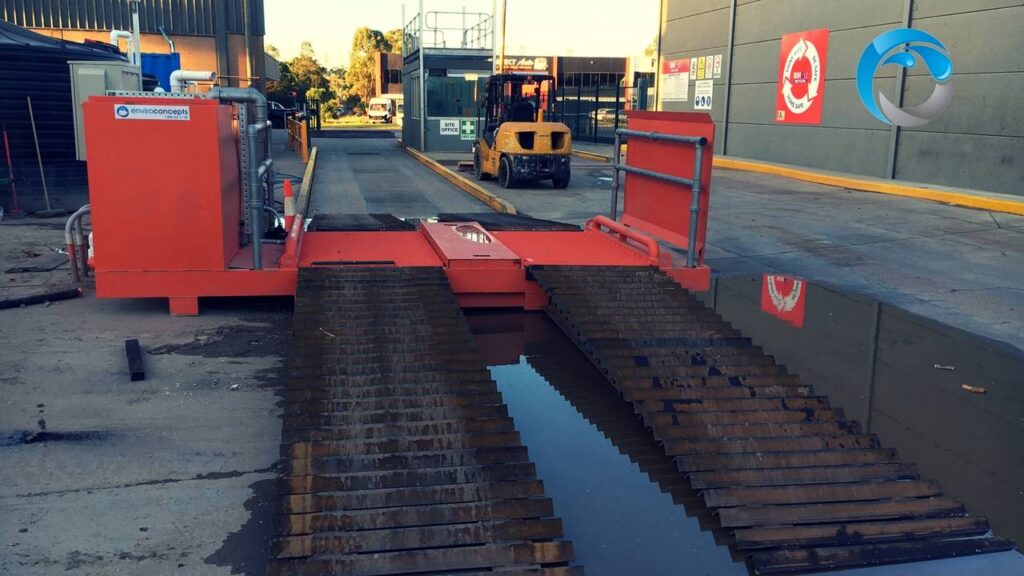Understanding Wheel Wash Systems: An Essential Guide

In industries like mining, construction, and transport, keeping your operation compliant and efficient is crucial. How can you ensure your heavy equipment meets environmental compliance while maximising productivity? The answer lies in implementing the right wheel wash systems.
Non-compliance with environmental regulations can lead to hefty fines, operational downtime, and a tarnished reputation. Moreover, the inefficiency of outdated wheel washing methods can escalate costs and reduce productivity. Don’t let generic solutions hinder your operations! Investing in a customised, efficient wheel wash system is the strategic move forward.
How Wheel Wash Systems Work to Keep Sites Clean
Wheel wash systems are engineered solutions designed to remove dirt, mud, and debris from the wheels and undercarriage of any vehicle exiting industrial sites. By cleaning a vehicle before it enters public roads, these washing systems prevent the spread of contaminants, ensuring safety and environmental compliance.
Key Components of Wheel Wash Systems
- Entry and Exit Ramps: Facilitate smooth vehicle movement through the system.
- Spray Nozzles: High-pressure nozzles target the truck wheels and undercarriage to dislodge debris.
- Rumble Grids: Vibrating grids or plates shake off stubborn mud and dirt.
- Water Recycling Units: Collect and filter used water for reuse, promoting sustainability.
- Control Systems: Fully automated controls manage water pressure, spray duration, and system activation.
The Cleaning Process
- Activation: As a vehicle approaches, sensors detect its presence, activating the system.
- Initial Cleaning: Rumble grids dislodge heavy debris from the tires.
- High-Pressure Sprays: Water jets thoroughly clean the wheels and undercarriage.
- Water Collection: Water drains are used in collection pits for filtration.
- Recycling: The water recycling equipment filters contaminants, making the water ready for reuse.
By integrating these components, wheel wash systems ensure that vehicles leave the site clean, reducing the risk of spreading contaminants to public areas.
Top Benefits of Implementing Wheel Wash Systems
Implementing a wheel wash system offers several advantages:
- Regulatory Compliance: Stay ahead of environmental regulations by preventing soil and debris from contaminating public areas. Avoid fines—upgrade to a compliant wash solution now!
- Operational Efficiency: Struggling with inefficient wash systems causing downtime? Modern wheel wash systems reduce washing time, allowing for continuous operation.
- Cost Savings: By utilising water recycling, these systems reduce water consumption, leading to significant cost reductions over time.
- Safety Improvement: Clean public roads reduce the risk of accidents caused by debris. Protecting public safety enhances your company’s reputation.
- Environmental Responsibility: Demonstrate your commitment to sustainability by minimising environmental impact through efficient waste management.
- Customisation: A tailored washing solution meets your specific operational needs, ensuring maximum effectiveness.
- Local Support: With Australian-made systems, you benefit from local support and shorter lead times.
Comparing Different Types of Wheel Wash Systems
Choosing the right wheel wash system depends on various factors, including site conditions, vehicle types, and operational requirements. Here’s a detailed comparison:
Portable Wheel Wash Systems
Features:
- Mobile, easy to relocate and set up.
- Ideal solution for temporary or multiple sites.
- Can be assembled without extensive groundwork.
Ideal For:
- Construction sites with changing locations.
- Projects with limited space or in need of a temporary solution.
Benefits:
- Flexibility to move as the project progresses.
- Quick installation of equipment reduces downtime.
Fully Automated Systems
Features:
- Minimal human intervention is required.
- Programmable settings for different vehicle types.
- Integrated water recycling for sustainability.
Ideal For:
- High-traffic sites with consistent cleaning needs.
- Operations aiming for maximum efficiency.
Benefits:
- Reduces labor costs.
- Ensures consistent cleaning quality.
Rumble Grids
Features:
- Static grids that vehicles drive over.
- Vibrations help dislodge heavy mud and debris.
- No water usage.
Ideal For:
- Sites with heavy mud and clay.
- Situations where water use is limited.
Benefits:
- Low maintenance.
- Cost-effective for basic cleaning needs.
Wheel Wash Baths
Features:
- Vehicles drive through a bath of water.
- Immersion helps remove stubborn contaminants.
- Equipment that can be combined with sprays for enhanced cleaning.
Ideal For:
- Heavy-duty equipment with significant soiling.
- Sites requiring thorough cleaning.
Benefits:
- Deep cleaning capability.
- Suitable for equipment and mobile vehicles, like a truck, with complex undercarriage.
Comparison Table
| Type | Features | Ideal For |
| Portable Wheel Wash | Easy to relocate, quick setup | Temporary construction sites |
| Fully Automated Systems | Minimal human intervention, high efficiency | High-traffic sites |
| Rumble Grids | Static grids that shake off debris | Sites with heavy mud and clay |
| Wheel Wash Baths | Immersion method for thorough cleaning | Equipment with heavy-duty contamination |
Choosing the Right Wheel Wash System for Your Project
Selecting the optimal system involves a comprehensive assessment:
Considerations
Type of Vehicles:
- Light vehicles, trucks, or heavy-duty machinery?
- Do vehicles have tracks or wheels?
Site Conditions:
- Space availability.
- Soil type and degree of contamination.
- Access to utilities like water and power.
Mobility Needs:
- Is the project temporary or permanent?
- Do you need a mobile, portable wheel wash system?
Environmental Regulations:
- Local compliance requirements.
- Necessity for water recycling.
Throughput Requirements:
- Number of vehicles per day.
- Cleaning speed needed to prevent bottlenecks.
Expert Assistance
Frustrated with suppliers who don’t understand your needs? At Enviroconcepts, we offer expert consultation to help you choose the right system. Our team assesses your specific requirements and recommends solutions that align with your operational goals.
Step-by-Step Installation and Maintenance Tips
Proper construction, installation, and maintenance are key to the longevity and effectiveness of your wheel wash system.
Installation Steps
Site Preparation:
- Level the ground and ensure proper drainage.
- Install any necessary foundations or supports.
System Assembly:
- Assemble the wash platform, rumble grids, and ramps as per manufacturer guidelines.
- Install equipment like spray nozzles and water recycling units.
Electrical and Plumbing Connections:
- Connect the system to power sources.
- Set up water supply and drainage systems.
Testing:
- Run the system to check for leaks or malfunctions.
- Adjust settings for optimal performance.
Training:
- Provide staff training on operation and safety protocols.
Maintenance Tips
Regular Inspections:
- Check for wear and tear on mechanical parts.
- Inspect nozzles and filters for blockages.
Cleaning:
- Remove accumulated debris from rumble grids and collection pits.
- Clean filters in the water recycling system.
System Updates:
- Keep software and control systems updated.
- Upgrade components as needed for efficiency.
Professional Servicing:
- Schedule periodic maintenance with professionals.
- Address issues promptly to prevent downtime.
Concerned about integration? Our systems fit seamlessly, and we provide ongoing support to ensure your operations run smoothly.
Mobile Truck Wheel Wash Systems: A Smart Solution for Cleaner Operations

Looking for an efficient, hassle-free way to maintain site cleanliness and comply with regulations? Mobile truck wheel wash systems are the perfect product for dynamic industrial environments. Designed for flexibility, these systems ensure that your truck wheels are spotless, even in challenging conditions.
Key Advantages of Mobile Truck Wheel Wash Systems:
- Easy Relocation: Ideal product for projects requiring mobility, these systems adapt seamlessly to temporary or multi-site operations.
- Enhanced Efficiency: With minimal equipment setup and easy integration, you can keep operations running smoothly without downtime.
- Eco-Friendly Service: Integrated water recycling units make these systems a sustainable product choice for environmentally conscious operations.
- Comprehensive Cleaning: High-pressure sprays and rumble grids ensure your truck wheels are thoroughly cleaned, preventing debris from leaving the site.
- Quick Contact and Support: Our dedicated service team ensures fast service, from consultation to ongoing maintenance.
Upgrade your operations with our tailored mobile truck wheel wash systems. Contact us today to explore how this innovative product can enhance your workflow, reduce compliance risks, and keep your truck wheels clean and ready for the road!
Environmental Benefits of Using Wheel Wash Systems
Implementing wheel wash systems contributes significantly to environmental sustainability.
Pollution Prevention
- Soil and Water Protection: Prevent contaminants from leaving the site and polluting nearby soil and waterways.
- Air Quality Improvement: Reduce dust and particulate matter spread to surrounding areas.
Water Conservation
- Water Recycling: Systems with water recycling capabilities minimise freshwater usage, conserving resources.
- Efficient Usage: Fully automated controls optimise water flow, reducing wastage.
Regulatory Compliance
- Legal Adherence: Meet or exceed environmental regulations, avoiding legal issues.
- Corporate Responsibility: Enhance your company’s image by demonstrating commitment to environmental stewardship.
Did you know non-compliance fines average $100,000? Investing in environmentally friendly systems is not just ethical—it’s financially wise.
Meeting Regulations: Compliance Made Easy
Environmental regulations in Australia are stringent, especially concerning contamination control from industrial sites.
Key Regulatory Bodies
- Environmental Protection Agency (EPA): Sets guidelines for waste management and pollution control.
- Local Councils: May have additional requirements specific to regions.
Compliance Requirements
- Preventing Contaminant Spread: Ensure no debris or pollutants are tracked onto public areas.
- Water Management: Proper disposal or treatment of wastewater.
- Documentation: Maintain records of compliance measures and equipment maintenance.
How Enviroconcepts Helps
You need custom solutions, not one-size-fits-all. Our approach simplifies compliance:
Our Simple 3-Step Process
- Consultation
- Assessment and Planning: After you contact us, we evaluate your site and understand your compliance needs.
- Customised Proposal: Present solutions tailored to meet regulatory requirements.
- Custom Design Service
- Engineering Excellence: Design systems that integrate seamlessly with your operations.
- Compliance Assurance: Systems are built to meet or exceed all legal standards.
- Installation & Support
- Professional Installation: Our team ensures the correct setup for optimal performance.
- Ongoing Support: We offer training, maintenance service, and updates to keep your system compliant.
Think custom solutions take too long? Think again! With our Australian-made products, we offer shorter lead times and local support. Contact us today to learn more.
Ensure Compliance and Sustainability with Enviroconcepts’ Portable Wheel Wash Systems

Ready to boost efficiency with tailored water treatment systems? Don’t let non-compliance put your operations at risk! Contact Enviroconcepts today to discover how our portable wheel wash systems can transform your operations, ensuring efficiency, compliance, and sustainability.
